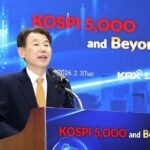Samsung Electronics Co. maintained its top position in the global TV market in the first half of this year, bolstered by robust sales of its newly introduced AI-powered TVs.
The company’s dominance in the premium TV sector, particularly models priced above $2,500 and its Neo QLED series, played a crucial role in sustaining its top spot.
According to a report released on Monday by global market research firm Omdia, Samsung Electronics captured a 28.8% share of the global TV market during the first half of the year.
This achievement positions Samsung on the verge of maintaining its No. 1 ranking in the global TV market for an impressive 19th consecutive year.
However, the company experienced a slight dip in market share, down 2.4 percentage points from the same period last year.
Trailing Samsung, LG Electronics Inc. secured second place with a 16.6% market share, while Chinese brands TCL and Hisense followed with 12.1% and 10.0%, respectively.
Samsung Electronics’ success was driven by its strong performance in the premium TV market.
The company dominated the markets for TVs priced over $2,500 and $1,500, commanding a 52.8% market share.
Despite this, the gap between Samsung and TCL has been narrowing. In the second quarter of last year, the gap stood at 21% points, but it has since shrunk to 16.7% points.
By Chae-Yeon Kim
why29@hankyung.com















